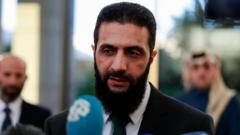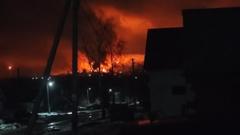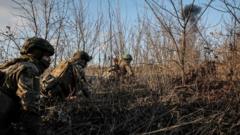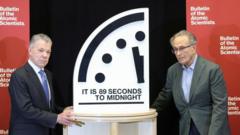**The changes coincide with heightened military tensions following U.S. support for Ukraine.**
**Putin Updates Russia's Nuclear Doctrine Amid Ongoing Conflict**
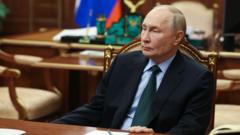
**Putin Updates Russia's Nuclear Doctrine Amid Ongoing Conflict**
**The revised doctrine sets stricter conditions for potential nuclear responses.**
In a significant development amid the ongoing war in Ukraine, Russian President Vladimir Putin has approved pivotal changes to the country's nuclear doctrine. The revisions clarify the circumstances under which Russia might consider deploying its nuclear arsenal, marking a critical response to perceived threats.
Announced on the 1,000th day of the Ukraine conflict, the updated doctrine articulates that an assault from a non-nuclear nation, if coordinated with a nuclear power, will be interpreted as a combined assault against Russia. This move follows the United States' decision to permit Ukraine to launch long-range missiles into Russian territory, escalating concerns regarding future engagements.
The new stipulations assert that any large-scale attack on Russia through conventional means—such as missiles, drones, or aircraft—could trigger a nuclear response. This rule also extends to attacks on Belarus, as well as threats perceived as undermining Russia's sovereignty. Additionally, aggression from one member of a coalition against Russia will now be regarded as an affront by all states within that coalition.
The revisions broaden the spectrum of nations and alliances subjected to potential nuclear retaliation. Defense experts and state media, like Tass, underline the significance of the updates, urging a detailed examination of the implications they hold for international peace.
While Putin has made nuclear threats in the past, officials, including Russian Foreign Minister Sergey Lavrov, emphasize a commitment to preventing nuclear war. Lavrov highlighted the importance of moving toward a world devoid of nuclear weapons during a recent G20 summit. Conversely, the Kremlin's rhetoric remains stern, with a spokesperson asserting the need for a thorough analysis of the new doctrine.
The Kremlin's announcement comes on the heels of the U.S. backing Ukraine's ability to engage in strikes deeper within Russian territory. Responding to this, Russia warned of "appropriate and tangible" repercussions, framing the U.S. involvement as direct participation in hostilities against Russia.
Peskov remarked that the new updates were timely and necessary to align with the evolving security landscape, asserting that the doctrine's release serves as a crucial warning to international actors involved in the current conflict.
Announced on the 1,000th day of the Ukraine conflict, the updated doctrine articulates that an assault from a non-nuclear nation, if coordinated with a nuclear power, will be interpreted as a combined assault against Russia. This move follows the United States' decision to permit Ukraine to launch long-range missiles into Russian territory, escalating concerns regarding future engagements.
The new stipulations assert that any large-scale attack on Russia through conventional means—such as missiles, drones, or aircraft—could trigger a nuclear response. This rule also extends to attacks on Belarus, as well as threats perceived as undermining Russia's sovereignty. Additionally, aggression from one member of a coalition against Russia will now be regarded as an affront by all states within that coalition.
The revisions broaden the spectrum of nations and alliances subjected to potential nuclear retaliation. Defense experts and state media, like Tass, underline the significance of the updates, urging a detailed examination of the implications they hold for international peace.
While Putin has made nuclear threats in the past, officials, including Russian Foreign Minister Sergey Lavrov, emphasize a commitment to preventing nuclear war. Lavrov highlighted the importance of moving toward a world devoid of nuclear weapons during a recent G20 summit. Conversely, the Kremlin's rhetoric remains stern, with a spokesperson asserting the need for a thorough analysis of the new doctrine.
The Kremlin's announcement comes on the heels of the U.S. backing Ukraine's ability to engage in strikes deeper within Russian territory. Responding to this, Russia warned of "appropriate and tangible" repercussions, framing the U.S. involvement as direct participation in hostilities against Russia.
Peskov remarked that the new updates were timely and necessary to align with the evolving security landscape, asserting that the doctrine's release serves as a crucial warning to international actors involved in the current conflict.









